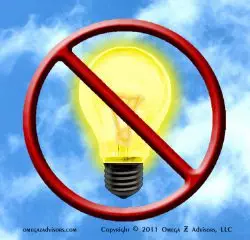Knowledge is Power, Not!
In Robert Heinlein’s science fiction book, Starship Troopers, the instructor, Mr. Dubois says, “One can lead a child to knowledge but one cannot make him think.” Thus, the pitfall in thinking knowledge is power shows up.
Thinking Knowledge Is Power Locks People In A Box
Often I will begin seminars by declaring, “You won’t learn anything new. Yet, if you’re like others, you’ll still find it very helpful.” How can this be? It’s because thinking knowledge is power locks us in a box. It makes us think stuffing of our minds with knowledge is good. This only produces a lot of fat heads.
Imagine people who collect a garage full of tools and don’t fix anything. Those who collect kitchen utensils and always orders out. Many treat knowledge the same way. It collects dust in the recesses of their minds. They don’t think about it. They don’t use it.

Thinking knowledge is power gives people a false sense of comfort.
The Power Of Learning Nothing New
So, I go on in these seminars. I say, “You already know most of what I will cover. But, you might not be using it to its fullest . . . if at all.” What if we used even 20% of what we already know but don’t use? What would happen?
We would see amazing changes in our careers, lives and world. For example, consider this question. How many people collect business books and self-help books as though they were collecting stamps? Most they never read let alone put their ideas to use.
Here’s a fact from a book editor. She said only about a third of the books bought are read. Thus cynically but truthfully she said, “It’s not about getting people to read your book. It’s about getting them to buy it.”
Yet, we can’t ignore the emotional appeal of knowledge. It’s triggers people need to feel secure. They know something. People spend tons on it.
Simply, learning new stuff though shouldn’t be the hallmark of a worthwhile learning effort. What would produce the greater return? Learning something new or putting something old into action? Dusting off old knowledge and rethinking it would be better. Perhaps the process caused us to look at things differently. Perhaps the process moved us to action?
Now, that is real power.



There’s one big omission I believe in your suggestion, Michael: the knowledge itself is NOT even usable!!! The very first thesis qualifying oral exam I participated in was for a student that had taken more graduate courses (all either A’s) than required! He could write the most complicated equations correctly from memory. He could do the same with detailed definitions. But he couldn’t apply this knowledge to the simplest application question or problem!!!!
In my terminology, he hadn’t considered (http://johncbennettjr.com ) the various topics enough to develop a vision encompassing the topics (and those linked with them); he hadn’t discussed them with others; AND he hadn’t self-assessed his ability to apply those visions to questions or problems!!!
Sadly, he didn’t have an effective, deeper understanding of the material! Had he encountered the right subjects on Jeopardy, he might have won some prizes or money! But in the real world, he didn’t stand a chance …
So are you saying, John, that it’s not even about possessing or thinking about that knowledge but putting it to use? There’s a difference between thinking about knowledge and putting it into practice?
I don’t care how it’s expressed: The learner doesn’t have a USABLE knowledge if the learner cannot apply it (with the possible exception of going on Jeopardy). Knowledge developed through a process that develops all the linkages to other material (vision), that’s brought into discussions to test, refine, and expand the vision, and that’s utilized in increasingly complex real-world problems WILL BE USEFUL AND USABLE. Knowledge not “assessed” through these steps will be highly unable to be put into practice!
For example: Suppose I read, studied, learned, and was assessed on my state’s driver information material, all of the motor vehicle regulations, and the best book on how to drive a car. Suppose I provided results of a physical exam and a successful eye exam with glasses as needed. If YOU were the commissioner of motor vehicles, would you issue me a driver’s license??? Note that I have NOT indicated I’ve ever driven a car at all? But I have more knowledge presumably than actual applicants have currently …